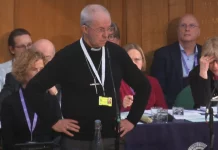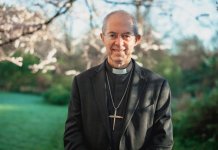On Friday 30 September two meetings are being held at Lambeth Palace Library. A number of groups have been invited to send two representatives to meet with two bishops (members of the LLF Next Steps Group) and Eeva John.
The Living in Love and Faith office has chosen not to publicise these meetings though they are not secret – I checked with them. The fact of the meetings, the groups invited, the agenda for the meeting, all can be made public – but LLF has chosen not to. Why? Why the reluctance? It means I have been cautious in writing this blog. I have named the organisations but am withholding the names of the representatives of the other groups, though I know them. The Church of England’s neurotic, unhealthy culture of secrecy and anxiety overshadows my feelings as I prepare to attend on Friday.
In the morning, from 11.00 to 13,00, representatives of the General Synod Gender and Sexuality Group, Inclusive Church, OneBodyOneFaith, MOSAIC and Diverse Church will meet Bishops Jonathan Baker (Fulham) and Bev Mason (Warrington) and Eeva John.
In the afternoon from 14.30 to 16.30, representatives from Changing Attitude England, Equal and the Ozanne Foundation will meet with Bishop Helen-Ann Hartley (Ripon), Bishop Sarah Mullally (London), also with Eeva John. Myself and Ann Reddecliffe will be representing the CAE Steering Group.
The meetings on 30 September will be the first time bishops have met corporately with representatives of inclusive and LGBTQIA+ organisations ever, and the first time since 2015 that a meeting has occurred at a senior level (the last time the previous Coalition met in Lambeth Palace).
LIVING IN LOVE AND FAITH MEETING AIMS
The invitation to this Friday’s meeting says the aims of the meeting are to offer participants an opportunity:
- to express their hopes, insights and concerns in relation to the questions raised by the LLF resources regarding identity, sexuality, relationships and marriage, and so to feel heard within the discernment process.
We are “to feel heard within the discernment process”. What does that mean? Do I, as I write this, feel heard? I am not able, yet, to tell whether I have been heard. My feelings, based on recent events in the Church of England involving bishops, tell me that I am angry about the futility of all this time and money being devoted to a process of delay that I fear may be in danger of being delayed yet again.
The two Changing Attitude England representatives will not only share “our hopes and concerns” but will also brief the bishops on our goals and expectations for the outcome of the Living in Love and Faith process. We have repeatedly asked the bishops and Archbishops to define the content of the phrase “radical new Christian inclusion”. We want them to understand that this must, MUST, include full equality in ministry and relationships for LGBTQIA+ people.
- to reflect on the findings of the churchwide LLF process, as reported in Listening with Love and Faith, and the reflections offered in Friendship and the Body of Christ.
- to share their responses – in the light of the Listening with Love and Faith report and the LLF resources – to the challenge posed to the Church by the Archbishops in 2017, to find ways forward that embody “a radical new Christian inclusion in the Church – that is founded in scripture, in reason, in tradition, in theology and the Christian faith as the Church of England has received it; that is based on good, healthy, flourishing relationships, and in a proper 21st century understanding of being human and of being sexual.”
Changing Attitude England values the opening remarks made by the Archbishop of Canterbury prior to the session devoted to the Call on Human Dignity at the recent Lambeth Conference. He set out the status of Resolution 1.10 and for the first time stated clearly that we are deeply divided in the Communion and that those on all sides of the division hold their beliefs and practices with Christian integrity, traditionalists and progressives alike.
This was a moment of transformation after over two decades in which our claims for recognition and respect, based on elements of Lambeth 1.10, have been denied. Archbishop Justin said that the minority who accept equal marriage “have not arrived lightly at their ideas that traditional teaching needs to change. They are not careless about scripture. They do not reject Christ. But they have come to a different view on sexuality after long prayer, deep study and reflection on understandings of human nature.”
LISTENING IN LOVE AND FAITH GATHERED RESPONSES
The report Listening in Love and Faith gathers responses to the course. Most of the comments on same-sex marriage expressed hope that the LLF Course might contribute to the “acceptance of same sex marriage” or “blessing of same sex partnerships”. The majority of respondents understood that the House of Bishops have a difficult but essential task but said that a decision on moving forward needs to be made soon. The decisions made by the House of Bishops needed to be bold, courageous, clear and honest.
This is the message I would like to ensure the bishops of Ripon and London clearly understand.
QUESTIONS POSED BY LLF
The Friday invitation also offers some questions to think about before the meeting:
- What key points do you take away from the Listening with Love and Faith report?
- What surprised, disappointed, worried you about the responses?
- What is hopeful within the responses?
- What do you see as the central issues? Significant opportunities for the Church?
- How do you see you and your constituents helping to resolve some of the questions raised?
I have not participated in an official LLF activity. I am a Christian, an Anglican, a priest, but I am not an active member of a parish church in the diocese of Salisbury. I had a long conversation with Alan Jeans, Archdeacon of Sarum and LLF Advocate for the Diocese of Salisbury. I have also been engaged in conversations with the members of the CAE Steering Group and the 466 members of the CAE Facebook Group.
The questions presented for us to think about before the Friday meeting all focus on responses to the LLF report. I have been actively campaigning for LGBTQIA+ equality in the Church of England for over thirty years. As a result, I am in no danger of allowing my focus to be directed by a CofE report or by the majority of today’s bishops, nor by LLF’s own questions. I am interested in the outcome, the how and when of radical new Christian inclusion and full equality in ministry and relationships for LGBTQIA+ people in the Church. The LLF process is still carefully steering us away from the ultimate goal for which we have been campaigning.
INCLUSIVE ORGANISATION GOALS
We should be attending the meetings not to receive a briefing from the bishops but to brief them on our expectations and goals. We have to believe with confidence in our mutual campaign for full equality in marriage and ministry and banning conversion therapy now. The following goals have been agreed by the organisations attending on Friday:
- A commitment to a new radical inclusion for LGBTQIA+ people in the Church of England.
- A commitment to justice and equality and an end to the systemic abuse of and discrimination against LGBTQIA+ people in the Church.
- Full equality in ministry and relationships for LGBTQIA+ people, lay and ordained in the Church of England, including equal marriage and the blessing of relationships.
- Removal of the quadruple lock and freedom for equal marriage in church and for clergy to preside.
- A ban on conversion therapy for LGBTQIA+ people.
- An end to homophobic and transphobic teaching and practice in the Church of England. Homophobic and transphobic teaching and practice underpins systemic abuse in the Church.
I plan to attend the meeting in listening mode, listening to the bishops and the representatives of the other organisations. Anything I may say will, I hope, come from my inner, spiritual core, from my intuitive self, and from my wisdom as a gay Christian priest who knew he was gay at the age of 12 when confirmed at St Barnabas Southfields by the bishop of Kingston, was accepted as an ordinand and knowingly ordained as a gay man by a gay bishop, no questions asked. That took place 43 years ago this coming Sunday.
One of the questions I would like to ask is why, forty-three years later, it is still so difficult for bishops to be open and honest about my sexuality? What inhibits them from taking responsibility to make a decision that enables me to resume my ministry as a married gay man?
I can offer an answer to that question in advance of Friday. The bishops are inhibited because of the lack of a deep, holistic, embodied, contemplative spiritual tradition in the contemporary church.
To support Changing Attitude England’s campaign pursuing a vision of the Church where LGBTQIA+ people will be welcomed and loved unconditionally you might like to join Changing Attitude England on Facebook.










